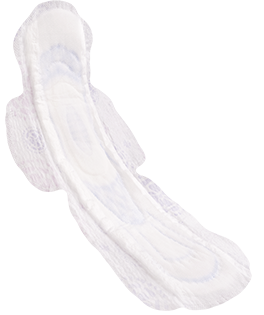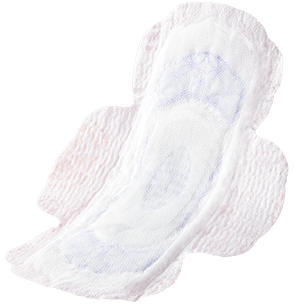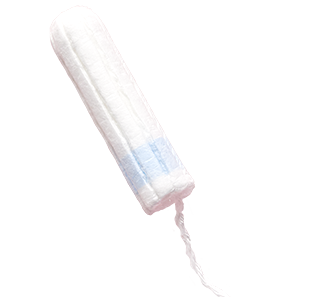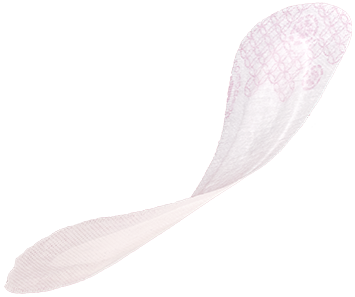Maxi Pads
Kotex® Maxi Pads offer protection against leakage, maximum comfort and a perfect fit with your body.
On average a woman loses 3 - 5 tablespoons of blood and tissue during her period. This varies from 75 ml’s (quarter of a cup) to 125 ml’s (half a cup) at most. Sister Burgie
No, you don't need to worry! It is normal 4 periods not to come on the same date every month – so don’t be worried if this happens to you. This is because periods come in cycles – a cycle is from the first day of one period to the first day of the next period – and not strictly months. A cycle is usually about 28 days, but because they are controlled by hormones, emotions, diet, health and life-style, they can be shorter (21 days) or longer (sometimes up to 90 days). This means that your period can come earlier or later than you expected.
If you have a period at the beginning of the month, and another towards the end of the month, this simply means that you have a short cycle. A cycle is from the first day of one period to the first day of your next period. It takes a couple of years for your cycles to ‘settle down’ which means that for the first few years of having periods, some cycles will be short (maybe 21 days) while others will be longer. The length of a cycle depends on when you ‘ovulate’ or ripen an egg. If you ovulate early in the cycle, you will have your period earlier. If you ovulate later, your period will start later. This is quite normal and nothing to worry about!
Married women having sex during a period is a personal choice. While some women are comfortable to have sex when she’s bleeding, it’s also OK for married women not to have sex during this time. Besides, not all husbands are comfortable having sex with a woman who is bleeding. Young women having ‘casual’ sex or multiple sex partners need to be warned though that having sex during a period is very risky and should be avoided. Here's why: 1. Carries the risk of pregnancy (if she has a short cycle). 2. Carries a huge risk of sexually transmitted infections because of the blood environment of the vagina. 3. Her cervix (mouth of the womb) is open during her period time giving infections – bacterial, fungal or viral – an open door into her womb, tubes, pelvis and abdomen. 4. A Sexually Transmitted Infection can become a Sexually Transmitted Disease - often FOR LIFE! 5. Some viruses like the Human Papillomavirus (HPV) increases a woman’s risk of also getting cervical cancer and others like Chlamydia can cause infertility.
While some women may need to change their pads/tampons more often (especially on the first and second day of your period) you should change 3 - 4 hourly.
Girls have periods because they’re SPECIAL! Girls have something called a womb – that’s why we’re called ‘woman’ – a man with a womb! We have all the qualities of a man but with something extra – an organ (the size of your fist) that prepares for a baby, then s-t-r-e-t-c-h-e-s with a growing baby for 9 months! Amazing! Nature and modern living clash a bit here because when a young girl starts to have her periods; it means that she is preparing an egg and her womb for a pregnancy! Too young and not ready for motherhood yet, young girls have to learn to cope with a cycle ‘bleeding’ or ‘cleaning-out’ of the womb – on average every 28 days. Think of it this way – menstruation is a celebration of your womanhood – and this bleeding lets you know that your body is working the way it should be!
It sounds as though you are having longer cycles – a cycle is from the first day of one period to the first day of your next period. It’s OK to have longer cycles! Sometimes events in your life can delay ‘ovulation’ or the ripening of an egg. When this happens, periods come later. If a woman is not sexually active, she does not have to worry if her period comes later. Other causes of delayed ovulation are: 1. Stress 2. Extreme exercise 3. Extreme dieting (anorexia) 4. Emotional distress.
Of course you can go swimming during your period! Just make sure you wear a tampon and not a pad!
Having sex is the only way to lose your virginity. Your choice of period protection has no affect at all, so there's no reason why you should not use tampons before you're sexually active.
Yes you can be around boys when you are having a period. Boys don’t know that you are having a period unless you tell them.
Starting menstruation can be anytime from the age of 8 to 18! It all depends on our life-style and genetic make-up. Girls who are very sport orientated and are tall and ‘skinny’ are more likely to start puberty and have their periods when they’re older. A girl who starts to develop breasts when she is younger is more likely to start her periods when she is younger. Interesting fact – girls who start their periods younger tend to stop having their periods when they are older than 50. Girls who start their period later usually stop having their period earlier – sometimes in her mid-40’s!
Attach the pad to the gusset of the panty. Change your pad at least every 4 hours. Wrap the used pad with toilet paper or in the packet provided. Carry on with the day as though nothing is happening!
Hi. If this has not happened to your sister before and she had sex about two weeks before this one-day-period, one explanation could be that she is pregnant. When the fertilized egg burrows into the lining of the womb (called the endometrium that becomes a period) it can cause a slight bleed. Women think that this is a period when in fact she is pregnant. I would suggest that she buys herself a home pregnancy-test kit. Other signs of pregnancy are breasts that feel ‘fuller’, nausea in the morning, feeling emotional and needing to P more often. Other reasons for a very light, short period may be after having the contraceptive injection (this in fact stops periods after a while), the first period after taking the contraceptive pill or having the new contraceptive ‘rods’ inserted. In this case, your sister could speak to the clinic sisters about it but I am sure they will tell her that this may simply be her body ‘adjusting’ to the contraceptive hormones. I hope this advice helps.
OK – ‘reverse-gear’ sex is not safe because sperm have little tails and these help them to swim. However, having any sex before a period is ‘safer’ – as far as protection from pregnancy goes. BUT unprotected sex leaves you open and vulnerable to some 35 sexually transmitted infections. NOT a good idea ….!!!
This is called ‘cyclical’ breast changes that begins when women start to have their periods and continues every cycle till menopause. Breast changes begin mid-cycle when her hormone levels are high. Then just before her period, low hormonal levels trigger menstruation. This can make the breasts feel heavier and uncomfortable. Make sure you wear a well-supporting, comfortable bra during this time.
For some women a heavy flow is in their genes - in other words, her Mom may have had heavy periods. Some women have heavier periods when they have more fatty tissue to store the hormone called oestrogen. Oestrogen is the hormone that helps the lining of the womb to grow. More oestrogen = thicker lining = heavy period. If a period comes late, the flow may be heavier.
Having a period earlier is not a problem – it simply means that you have had a shorter cycle. A cycle is from the first day of one period to the first day of your next period – the average number of days is usually 28 (sometimes cycles are shorter – sometimes they are longer and this is normal). This is nothing to worry about!
It best to do something about period pain before it gets really bad. Start by taking 1 tsp molasses in boiling water every morning (for the minerals your body needs). You can also take an aspirin the day before your period starts. Use heat to reduce pain - a hot water bottle, hot bath or shower. You can also ask your chemist to recommend a pain killer.
Is it your tummy or your womb? Some women get an ‘upset tummy’ the day before her period starts or she may feel nauseous on the day of her period. Pelvic pain on the other hand is usually the contracting womb, but it can also be caused by a Urinary Tract Infection or other pelvic infections. If you also have a temperature, this could indicate an infection that needs to be seen to at the clinic or doctor. If the pain is relieved with heat – bath, shower, and hot water bottle – this is probably ‘period pain’ that will pass. Ask your pharmacist to recommend a pain killer that will help you to get through these difficult days!
Having period pains before the bleeding starts is quite normal and you don’t have to stress about it – just learn to deal with it. Picture the womb as the size of your clenched fist – now squeeze your fist to imitate ‘contractions’ – because this is what the womb does before a period starts – it contracts (or squeezes) to break down the inner lining called the endometrium into a liquid of blood and tissue that becomes your period.
Period pains are usually caused by a ‘contracting’ womb. This hollow muscular organ – the size of your clenched fist – needs to ‘squeeze’ to break down the inner lining called the endometrium so that it can clean out the womb because your body is not pregnant, and the lining is not needed. A hormone called prostaglandin helps the womb to contract, but if a woman has too much of this hormone, the contractions can be really strong and painful. Prostaglandin can be controlled by simply taking an aspirin the day before your period starts.
No, period pains do not affect your chances of falling pregnant.
Backache before a period can be caused by bad posture. Sometimes it is caused by the position of the womb when it's leaning backwards instead of forwards. In severe cases, it can be caused by endometriosis.
If a girl is sexually active and misses her period, the first thing she will worry about is pregnancy. Pregnancy kits are available at your pharmacy so you can do your own pregnancy test as soon as you suspect that you may be pregnant. If a girl is not sexually active and does not have a period for 2 months, there could be other reasons why her period is delayed. 1. Stress. Are you writing exams or is there a stressful situation in your life right now? 2. Are you over-exercising in preparation for a major sporting event? Women often stop having her periods until the sports event is over. This is OK 3. Are you dieting excessively and losing weight? This can also stop periods 4. Are you ill or have you been ill recently? This can also delay periods for a while.
No. This is bleeding that is longer than a period. If this continues, please go to the clinic or see your doctor.
Some girls feel nauseous – it’s not a big deal if you don’t eat on the first day of your periods. Just make sure you are drinking lots of liquids – including soup and hot chocolate.
OK – a couple of things. A cycle is from the first day of one period to the first day of your next period – the average number of days is usually 28 (sometimes cycles are shorter – sometimes they are longer and this is normal). I don’t know how old you are or your medical history, but your breasts should not be sore, and they should certainly not have any discharge. So yes, this is something you should worry about. Please see a doctor / clinic ASAP.
A smelly discharge usually means an infection and this should be treated at your clinic or doctor. Not all vaginal infections are sexually transmitted e.g. bacterial vaginitis. If a woman has had sex and then gets a smelly discharge, this could well be a Sexually Transmitted Infection. The sooner it is treated, the better!
A discharge that’s smelly, itchy and causes irritation and redness to the vagina and labia is an infection discharge. The colour can be yellow, green or white and can be frothy and it has a bad smell. This must be treated at the clinic or doctor. If you are sexually active, your boyfriend should also go for treatment. Untreated infections can cause many complications.
I take it the rash is on the labia or genitals? Any rash that itches and burns (at any stage of the cycle) needs medical attention – it could be thrush but it could also be a genital infection. Please go and see your doctor or clinic nurse the next time you have this rash so that it can be identified and treated. The longer you leave it, the worse it will become! It may simply need a course of antibiotics.
Sure you can play sports during your period. Wearing tampons makes it so much easier and more comfortable.
Yes, you can eat anything healthy during your period.
There is a difference between having a period and bleeding during pregnancy. Some women experience very light bleeding when they become pregnant, and this is called an 'implantation bleed' . This is usually not a problem. But when a woman knows that she is pregnant, and she starts bleeding, she should go to her nearest clinic or doctor. Bleeding during pregnancy usually means that there is a problem.
Prepare
Before and after inserting a tampon, always make sure your hands are super clean and have just been washed. It’s also a good idea to become familiar with your body as it’s easier to insert a tampon when you know where it’s going. So, get into a comfortable position (maybe try standing with one foot on the edge of the bath or the toilet), grab a small mirror, and place it between your legs and have a look. Find your labia (the lips or folds of skin covering the entrance to your vagina) and gently spread it open with your fingers to find the entrance to your vagina. This is where the tampon goes.
Unwrap
Hold the tampon firmly on either side of the dotted line and twist sharply in opposite directions. Remove the bottom piece of wrapper so that the string is exposed and pull the string so that it hangs down. Hold the tampon by the string and then remove the other half of the wrapper. Once you’ve unwrapped the tampon, make sure you don’t touch it too much or place it on any surface.
Insert
Tampons should be held at the end where the string is positioned. Try to stay as relaxed as possible so that the muscles around the vagina don’t tighten. And remember to stand with one leg on the toilet or a chair. Slant the tampon towards your lower back and ease it into your vagina by pushing it with your index finger as far as it will go. Just make sure you keep the tampon at an angle and don’t try and push it straight. This will help make things as easy and comfortable as possible. The string should also stay outside your body so you can easily remove the tampon later on.
You shouldn’t be able to feel the tampon if you’ve inserted it properly. If you feel any discomfort of pressure it may mean that you haven’t inserted the tampon far enough or correctly. If this is the case, try pushing the tampon in further, or remove it and try again. And don’t worry, there’s no chance of you pushing tampons in too far because the cervix (the opening to your uterus) is too small for a tampon to fit through – so tampons definitely can’t get lost! Just remember to stay relaxed and there’ll be no dramas!
Change
A light tug on the string will tell you if it’s time to change the tampon. If the tampon doesn’t slide out easily you can leave it in for a bit longer. Tampons should be changed about every four hours, depending on the heaviness of your period. But, the tampon can be left in for a maximum of eight hours if it won’t budge.
Remove
To remove the tampon pull the string at the same angle at which the tampon was inserted. If you can’t find the string, don’t stress, just make sure your hands are clean, get into a squatting position, and remove the tampon with your fingers.
Dispose
Don’t flush tampons and wrappers down the toilet – you might clog up the plumbing system and it’s bad for the environment. Just wrap it in some toilet paper (or put it in a bag) and place it in the bin or sanitary disposal unit.

Maxi Pads
Kotex® Maxi Pads offer protection against leakage, maximum comfort and a perfect fit with your body.

Ultra Thin Pads
Kotex® Ultra Super Pads offer discretion, ultimate protection, comfort and a perfect fit with your body.

Tampons
Kotex® Tampons are the ultimate in Comfort, Fit & Discretion with a unique blue ultra absorbent zone for extra leakage protection.
